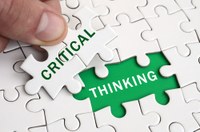Critical Thinking Developmental Milestones
Knowledge Alone is Not Enough. Knowledge acquisition alone is inadequate preparation for independent and competent care of patients in our increasingly complex clinical environments. Our learners must learn to think critically with that knowledge to be effective in their clinical role. Have you ever wondered how best to assess critical thinking skills in our learners? Our accrediting bodies certainly expect that we can assess where they are on their journey toward becoming competent clinicians capable of being entrusted with independent patient care decision-making.
What is Critical Thinking? In 2014, an elite working group of educators from 17 Schools of Medicine and Nursing in the U.S. came together and proposed milestones of critical thinking.1 This group defined critical thinking in two components: “the ability to apply higher-order cognitive skills (conceptualization, analysis, evaluation)” and “the disposition to be deliberate about thinking (being open-minded or intellectually honest),” both of which lead an individual to take action that is logical and appropriate.
Critical Thinking Skills Must be Taught and Specifically Assessed. We know that novice learners differ significantly in how they store and organize information in their brains as compared to experts.2 The novice learner attempts to solve clinical problems from a disconnected set of information points in their brain and is challenged when confronted with the need to assimilate disparate sets of data into a coherent assessment and plan for patient care. As faculty experts, we cannot simply assume that time and experience will naturally convert the novice learner into a proficient critical thinker. Faculty must be able to recognize critical thinking deficiencies in learners so that we can assist them in this vital transition from an unreflective to an accomplished critical thinker. The task force agreed on several fundamental points related to this process:

- Milestones for critical thinking do not lock a person into a single developmental state
- Critical thinkers at any stage may regress under certain circumstances, such as confronting a demanding workload with sleep loss and fatigue, or emotional exhaustion brought on by personal factors
- Competence in critical thinking is not automatically gained with increasing level of training or by competence in other domains
- One cannot assume that clinicians with years in practice are accomplished critical thinkers; conversely, undergraduate students may already be highly developed critical thinkers
The task force identified five stages of critical thinking (shown below) that reflect progressively mature approaches to metacognition, attitudes, and skill development in this area. Review this table to compare the five stages and to help you assess your learners’ developmental stage. An additional sixth “devolved” stage represents a temporary state brought on by external forces that reverts to the pre-stress level of critical thinking and is described after the table.
Stages of Critical Thinking | |||||
|
Unreflective Thinker |
Beginning Critical Thinker |
Practicing Critical Thinker |
Advanced Critical Thinker |
Accomplished Critical Thinker |
Meta-cognition | No ability to examine own actions and cognitive processes | Aware of different approaches to thinking; still requires external motivation to reflect on her own thought processes | Applies conscious effort in own critical thinking | Solid repertoire of approaches to thinking; consciously performs critical thinking; adept at self-regulation | Uses theories of metacognition to understand and conceptualize problems; habitually monitors, revises, and rethinks approaches for continual improvement in cognitive strategies |
Attitudes | Fixation on current working beliefs and unable to accept ambiguity | Receptive to but rarely solicits feedback on thinking | Humility in acknowledging uncertainties; open to challenges; welcomes new approaches | Actively solicits and accepts feedback; natural curiosity about other approaches to thinking | Strives to advance others’ approach to thinking; acknowledges assumptions and biases; embraces uncertainty |
Skills | Single approach to gathering and processing information based on crude scripts | Sporadically uses different approaches to thinking; may include only most likely explanation for a clinical problem | Can articulate multiple approaches to problem-solving | Uses intuitive and analytical strategies interchangeably; avoids cognitive biases | Models critical thinking to others; toggles adeptly between analytical and intuitive approaches in solving problems |
Table 1: Adapted from Papp et al. 2014
A Temporarily Devolved State. Critical thinking can be compromised by external forces (family illness, etc.) resulting in a devolved state of thinking. The challenged thinker is temporarily resistant to what they already know about critical thinking and problem solving making them different from the beginner critical thinker who operates in ignorance, not resistance. In this devolved state, this stage is characterized by a failure to recognize their own personal cognitive biases, unwillingness to reflect on their own thoughts and approaches to problem-solving, and reversion to a singular approach to thinking about the current problem.
Prologue. We suggest that you review these stages of critical thinking and commit to using them to assess and guide your learners so that together we can make UofL a Great Place to Learn.
References:
1. Papp KK, Huang GC, Lauzon Clabo LM, et al. Milestones of critical thinking: A developmental model for medicine and nursing. Academic Medicine. 2014;89(5):715-720.
2. Ambrose SA. How learning works: Seven research-based principles for smart teaching. San Francisco, CA: Jossey-Bass; 2010.